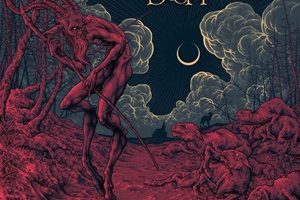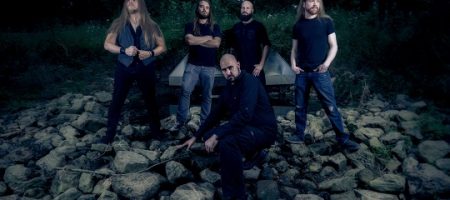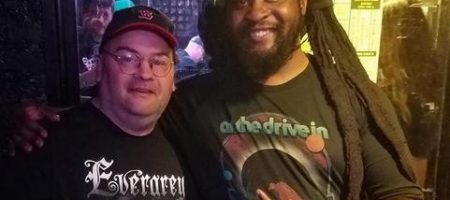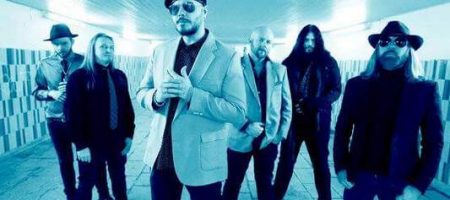Novembers Doom – Traversing the Grove
Sunday, 10th November 2019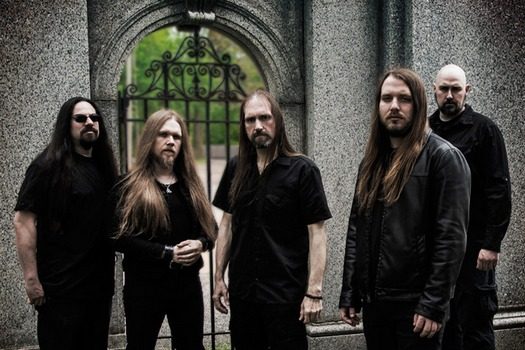
Celebrating thirty years as a band, Novembers Doom has been one of those acts that slip under the radar for certain metal audiences or become a cult-classic favorite for others. Their love of the genre is unquestionable – intertwining doom and death metal aspects in a musically intoxicating way as to embrace the darkness and gloom to set yourself free. Their latest album Nephilim Grove further cements their essence of strength, resolve, and permanence – channeling emotions we as humans want to process in a healthy manner, but often struggle to fully release. Let Novembers Doom be that conduit to the pain, the misery, the anger – and allow you to cleanse yourself to see happiness and peace again.
We reached out to vocalist Paul Kuhr and he was happy to fill us in on the changes within the band. Prepare to learn more about the label shift to Prophecy Productions, the alternate versions of a couple of new songs off the album, thoughts on social media/ subgenre categorization these days – as well as some healthy discussion about growls/cleans in the band, and the tribute album from Brazil that was done to honor the discography of Novembers Doom.
Dead Rhetoric: After being a part of The End Records since 2005 with The Pale Haunt Departure, Novembers Doom has now signed a new record deal with German label Prophecy Productions. How much of a challenge and process is it given the current marketplace for the band to find the right partner to support the band’s mission and creativity, and why is Prophecy the right place for the band today?
Paul Kuhr: A really good question. I can answer that by saying, I don’t want to speak poorly of our past record label, but I don’t feel that The End Records was ever the right home for us. And the only reason why I say that is they did not have a strong European presence – which is something that this band has needed throughout our entire career. It’s the one area that we lacked – we liked working with The End Records, they did a lot for us but in regards where we felt sales and live performances and crowd reactions, things like that – our fanbase is primarily in Europe and South America. It’s not as focused in America – so it was important for us to find the right fit where we would get the proper push and attention that we needed where our fanbase was. When we were looking for a new home when the contract was up with The End Records, we had a very focused vision for what we were looking for.
Prophecy almost made it impossible to say no. Anything that we brought up that was a concern, they had an answer for – and we liked everything that they said. I really do feel that we have found exactly where we belong for a label in our career.
Dead Rhetoric: The new album is Nephilim Grove – how do you believe the songwriting and recording process went this time around, and can you pinpoint specific instances where you knew you were developing something special that can stand up well in the band’s discography?
Kuhr: One of the goals that Novembers Doom has had all along is we constantly try to raise our own bar. We never set out to say we are better than this band, better than that band – our goal is to be a better Novembers Doom with every record that we put out without trying to pigeonhole ourselves in any specific genre or lump us into a category. We write what we are inspired by and what we feel and think the band should be. It’s either going to be a death metal song, or a ballad, or something in between- or anything we want it to be. Somehow we have managed that no matter what we do, it sounds like Novembers Doom. It’s a matter of making it a better Novembers Doom record- and the only way we can constantly do that is if we challenge ourselves.
This time in the songwriting we not only challenged ourselves, but we pushed each other. This is the first time in the band’s history that we’ve had the same lineup for three consecutive albums. We’ve never had two in a row- so when you have new blood in the band, you are constantly worried about the new guy fitting in, writing the material that fits with the rest of the band, and you are watching what they are doing. With the lineup we have now, everyone is on the same page and we all trust each other. We know that everyone will be able to do the job, so we can finally focus on pushing each other to try new things and to work harder and believe that with less focus on other areas we were all able to focus on our own performance and our own writing. In my opinion, I think we’ve succeeded any other album we’ve done as far as musicianship and quality and writing and creativity.
Dead Rhetoric: Is it important at this point in the band’s career to play to each other’s strengths to get the best performances and the best material our of everyone?
Kuhr: I do. I definitely don’t think you want to push someone in the band to do something that you know they aren’t capable of. There are degrees of challenge and push. I think that playing to another band member’s strengths works in our favor. But I’m not really sure that’s a goal that we set out doing. We just know what our drummer’s capable of, we know what our bassist is capable of. Our bass player for instance is capable of a lot more than we let him do within this band- he’s phenomenal. He can play Steve Harris to a tee- but that doesn’t fit Novembers Doom. Sometimes we have to reign him back a little bit. There are times where the talent level and that kind of inspiration can go too far in what we do. We have to be aware of that as well. I think trusting each other is a huge part of this – it leads to our longevity and creativity. We just trust that everyone is going to know their role and know what they are going to do and we don’t have to worry about it.
Dead Rhetoric: Did you have a better idea of what you wanted to get across for the lyrics on this record – as when I interviewed guitarist Larry Roberts for the last album Hamartia, he told me you were working out things up until the eleventh hour in the recording studio…?
Kuhr: Yeah, the last album was awful for me. I was in such a writing block, I was sitting down and the drums were being recorded and I’m looking at the schedule seeing that I had to start my vocals in two weeks- and I don’t have one word written yet. I took a week and wrote all the lyrics, and in the second week wrote all my harmonies and melodies and jump in to start recording. I was not in the right mind space to do it – but I got there in the final hour. This time around I had time – I felt creative early on and for a couple of months early on, I had lyrics. I was really able to focus on the melody and harmony and layers to get a lot more out – try new things and put things into my vocal performance than I ever have.
Dead Rhetoric: Do you consistently put personal experiences into the lyrics that make things fresh and unique?
Kuhr: I always felt that I’m not a good storyteller. If I don’t have a personal story to draw from, I’ll draw that inspiration from somebody close to me to tell their story through their eyes. Every song on the record is very personal in one way or another – from my own personal experience or a loved one, I’m telling it through their eyes. I’ve never been able to sit down and make something up – the only time I did that was with “The Knowing” and even that I still tried to put a personal element into it. I have to try to create some sort of connection with the listener, so for me it helps if I’m as transparent as possible with what I’m writing.
Dead Rhetoric: How did you decide upon the two ‘matte variant’ versions of “What We Become” and “The Clearing Blind” for the album – were those obvious choices to have alternate versions of?
Kuhr: That was a last-minute decision. I called them ‘matte variant’ versions because the one thing everyone kept saying during the writing of this album is all the different colors we were adding to the music. When we stripped the songs down and we went to our keyboard player Ben and said we wanted to strip out the heavy and add in more of his keyboards and piano, these were those versions. I knew right off the bat “What We Become” would have been the choice, and originally that is the only one we were going to do. After we did it and it came out so well, Prophecy said can we do another one? We tried “The Clearing Blind”, and if we were to do another one from the album, possibly the title track would work out, I don’t know. Now we are considering going through our back catalog and taking two songs from each album and giving them the same treatment, putting that out as one alternate release, we’ll see.
Dead Rhetoric: What would you say about the evolution of your voice in the framework of Novembers Doom from the start of the band to today? Where do you think you’ve seen the most change and growth, and how do you handle the feedback from certain camps that may not necessarily adapt well to the changes?
Kuhr: My confidence. I’ve never taken a vocal lesson in my life. I’ve never considered myself a singer, or a good singer by any stretch. I think I’m completely tone deaf and I can get away with things – but I’m capable of more than I believe I actually can do. Our engineer and producer Chris, I love working with him because he challenges me and gets me to try new things. He can pull the best out of me when I don’t think that I have it. I’ll try it and I find out I can do it. It’s one of those things throughout the years where my confidence has grown, I’m more apt to try new things.
My growls… they’ve gotten better but I think they’ve kind of remained pretty much the same throughout my entire career. I have grown as a more confident vocalist, even though I don’t really consider myself a singer. I give it what I can, and I’m lucky I’ve got great people behind me that I can make it work.
Dead Rhetoric: Could you ever imagine a Novembers Doom record where you would do 100% completely clean vocals or will there always be that dark growl color to add for a difference maker in the band?
Kuhr: I’ve always said that I would never abandon the growl because the growl is what we started with, and it will end with that. My age and my health and time dictates a lot of what I said years ago. I don’t want to abandon the growl but I will be 48 years old this year, and this band is over 30 years old. It is not as easy to do now as it was when I was younger. It’s harder for my throat and my voice to recover from that sort of thing- especially multiple shows in a row. My voice after three days is gone – it’s becoming more difficult for me so there are times where I have to make decisions and choices based on that. If we are going to go out and do say six to ten shows in a row, I’m going to tailor some of this stuff where I think I’m going to be able to get through it. Age starts to play into that for sure.
Dead Rhetoric: What do you think are some of the hardest concepts for the average fan to understand about the decision making process that goes on within Novembers Doom when it comes to your activities and outlook on how productive you can be, considering your career/family responsibilities?
Kuhr: I think everybody assumes that when you are in a band, that’s your job – and even some of my family members, not direct members, but other family members will walk into a store and see our CD’s for sale on a shelves, and think we are doing great and making good money off of this. We’ve never made money off of this, and that is never what this has been about. I think a lot of people think if you are in a band, you go out on the road and tour, and that’s your life and how you make your living. There are some bands that are very lucky in that regard and have the opportunities early on to make a good living from their music. We’ve never been that band – we’ve always considered Novembers Doom as a glorified hobby. If it would have turned into something more than that, we probably would have accepted that.
But at this point in our lives, it is a glorified hobby. It will always be that – and we do it because we love doing it. We have to make decisions based exactly on our lives. Jobs, families, our families, our health – so we are limited in what we can do. We have to be selective. Being selective means we want the most bang for our buck in front of the most amount of people as possible. Going out on a small US club tour for three weeks, when we can go to Europe and play a couple of festivals and four shows and play for more people in that short run than we would in three-four weeks in the states, those are the decisions we have to make. We are not saying that we are abandoning the United States, we can do long weekends – a Friday, Saturday and Sunday on the East Coast, something like that. We will never be able to tour for thirty days in a row, we just can’t afford that.
Dead Rhetoric: In your career with Novembers Doom, have you ever had a favorite failure that you can now look back upon and see that it set the band up for a future, better outcome or successful endeavor down the line?
Kuhr: I think every time something negative happens, we use it as a learning experience and try not to make that same mistake again. We’ve made mistakes in Europe with certain promoters, trusting the wrong people. We’ve had an instance where our drummer Sascha at one point, he had left and (joined) Forbidden and that was a difficult time for us to find the right person until Garry came along. Everything that we’ve done, we’ve managed to overcome and keep moving forward. You are a band and you are close, you are like family and you fight like brothers. There are moments where people blow up and people are like, ‘Fuck this- I quit!’. The band’s over… a couple of minutes later everyone calms down. It’s never come to a moment where we were not able to fix it and work it out. Listen to what we do together, listen to what we create. It doesn’t matter if anybody else likes it- we love what we do. That’s the real meaning for us, the music and the creation and what we do together. We feel we write some amazing stuff together. That outweighs all the negative.
Pages: 1 2












